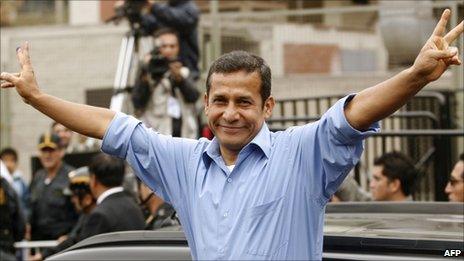Profile: Ollanta Humala
- Published

Ollanta Humala: A champion to some, a dangerous enigma to others
Left-wing nationalist Ollanta Humala, 48, first came to national prominence in 2000 when he led a short-lived military rebellion against then-President Alberto Fujimori.
But he insists that in the decade since, he has changed - and so has Peru.
In 2006, the former army colonel came second in the presidential election run-off to Alan Garcia.
Then his left-wing views won widespread support among Peru's poor majority, but worried the upper and middle-classes and led some to compare him to Venezuela's Hugo Chavez.
But during the 2011 election campaign, he adopted a more moderate stance.
He played down his former ties to Mr Chavez and emphasised instead a desire to follow the lead of Brazil's former president, Luiz Inacio Lula da Silva, and his Workers' Party.
Respect
Mr Humala said he would expand the state's role in the economy and extract higher royalties from mining companies that account for more than half Peru's exports, and use the money to reduce poverty.
But he also promised careful fiscal policy and respect for Peru's free trade deals.
His critics worry he will move Peru in a more populist, authoritarian direction and damage the economy.
Mr Humala has insisted he will respect the constitution and the rule of law, swearing on the Bible in May to uphold democracy and press freedom.
Mr Humala has been accused of committing human rights abuses during the fight against Shining Path rebels in the 1990s when he was an army captain, but he has denied the allegations.